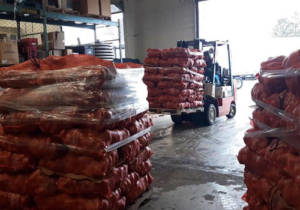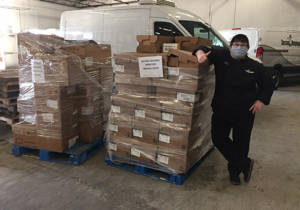The COVID-19 pandemic has impacted nearly every aspect of our lives over the last several months. In many ways, the food sector is one of the hardest-hit corners of our economy. Empty grocery store shelves, closed restaurants, and canceled events are signs that even as cities begin to open back up, there is still a long road to recovery.
What does this evolving food supply mean for Second Helpings and for the increased number of Hoosiers needing food assistance?

“It’s been a logistical rollercoaster,” explains Jon Meinert, director of food rescue and transportation. “We take great pride in our work and enjoy a challenge. Needless to say, we wouldn’t have been able to do all that was needed if it wasn’t for all the community support we’ve received.”
In “normal times” Second Helpings rescues 210,000 pounds of food each month from wholesalers, retailers, hotels and restaurants. The food rescue team works on a regular schedule, making daily and weekly trips to grocery stores, wholesalers and bakeries to rescue excess inventories. Hotels, caterers, and event venues all call Second Helpings to pick up extra prepared food that didn’t get served. For 22 years, the food rescue program provided a reliable steady flow of food that ultimately became nutritious meals for struggling families throughout our community.
But each stage of the pandemic has brought new challenges for the food rescue and hunger relief programs.
It started with cancelled events. Prepared food, ready to go on buffet tables or be plated for table service, came in from all over the city. Some of it was easy to repurpose into hunger relief meals; some was more challenging. One rescue included racks of condiments already placed in bowls and on platters – ready for a large event that never happened.
Then came the grocery shortages.
Customers noticed common products weren’t available and stocked up on what they could find. Nearly overnight, rescues from grocery stores – regular and reliable sources of valuable proteins, dairy products other goods – dried up.
The hospitality industry has a special place at Second Helpings – they frequently volunteer, donate food and money, employ Culinary Job Training graduates, and are among our longest supporters – so the calls from restaurants were particularly heartbreaking. While some moved to carry-out or delivery only, others closed their doors and called Second Helpings to clear out their inventories.
Despite the tumult and uncertainty, restaurants, distributors, and grocery stores know food doesn’t have to go to waste. By donating it to Second Helpings, this food is still put to its intended use – ending up as a nourishing meal for someone who needs it.
We’ve all seen the pictures of closed food processing plants, and how reduced demand for food from restaurants and school lunch programs left farmers with products that couldn’t get to market. Large supplies of eggs, milk, cheese, and other products came to Second Helpings, not in the usual balanced daily mix, but in large quantities with little predictability. One day it might be pallets of broccoli, the next eggs, and another day, cheese. Tragically, some farmers even offered donations of whole animals that we couldn’t process.

Executive Chef Kathy Jones celebrates a large delivery of beef from McFarling Foods.
In April, Second Helpings rescued 310,450 pounds of food – an all-time high in the organization’s 22-year history. That record might be cause for celebration at Second Helpings – but when it’s the result of struggling family businesses and canceled celebrations, it’s sobering.
Rescued food isn’t staying in our facility for long. Second Helpings is distributing food to food pantries and other partner agencies in quantities that wouldn’t have been feasible four months ago. The need for this food is greater than ever before, as the economic impact of COVID-19 has left thousands of local families facing hunger for the first time in their lives.
“While the increased need feels devastating, the outpouring of support from new and long-time partners has been encouraging,” says Senior Director of Programs Nora Spitznogle.
Twenty new partner agencies, including churches, community centers, and low-income senior apartments, now provide Second Helpings meals to thousands of people in need, many of whom are homebound during the pandemic. Fortunately, food donors like Sysco and McFarling Foods have stepped up to increase their support and help to meet that need.
There is certainly a long way to go before anything about the food industry feels “normal” again – and very likely, some things may change for good.
Throughout this evolving, complicated season, though, businesses, individuals, and organizations across our community remain committed to our shared mission. We can feed Indy – together.
